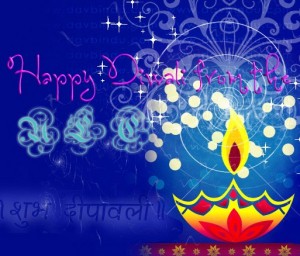
Diwali is an ancient religious ceremonial holiday celebrated across a multitude of faith. It is also referred to as Devali and Deepavali in certain countries. Diwali signifies a festival of lights and takes place over a five day period. The festivities of Diwali begin on a day called Dhanteras, or Dhantrayodashi. This day is the 13th lunar day of Krishna paksha in the month of Ashwin on the Hindu calendar. The festival lasts until Shukla paksha’s second lunar day, Bhaubeej. This day falls in the Hindu month of Kartik. According to standard calendar observations, the festival takes place between the middle of October and the middle of November. In the nations of Fiji, Guyana, India, Mauritius, Myanmar, Nepal, Singapore, Sri Lanka, Suriname, Trinidad and Tobago, Diwali is an official national holiday.
The festival of Diwali holds a major spiritual significance across many faiths, making it one of the most widely celebrated religious holidays. In the religion of Jainism, the holiday is celebrated as Deva Devali and revered as the day that Lord Mahavira attained Nirvana, a sacred state of spiritual enlightenment. For members of the Sikh religion, Diwali is celebrated between late October and mid November. To them, the holiday signifies a remembrance of the end of the imprisonment of sixth guru Hargobind singh. In Sikhism, Diwali is marked by reading of the scripture at a holy shrine and the consumption of a vegetarian meal designed to show reverence toward both mankind and animals. Hindus consider Diwali to be one of the most special occasions of the year and is a time which is commonly spent with the family and in the home.
Much like many other major holidays across the world, Diwali shares some basic aspects of tradition and celebration that date back to early mankind. Together, families and friends gather to eat meals, give thanks and celebrate their faith. Because Diwali is the festival of lights, many households symbolize this with the lighting of many candles as a reverent gesture. Different faiths and different geographic areas all celebrate the festival of Diwali in their own unique fashion. Many faiths and cultural areas highlight the celebration with displays of fireworks in tribute to the concept of Diwali being a festival of lights.
For interfaith ministers who have become ordained by the Universal Life Church, learning about interfaith holidays is an important part of being able to minister effectively to people who have come from different faiths or who embrace different aspects of faiths from around the world. Diwali is a celebration of joy and enlightenment, and as such, being able to understand it and celebrate it with a community of faithful people is a positive concept. When one chooses to become ordained by the Universal Life Church, they become responsible for the ministration of good faith. Finding a way to include all who care to join in a positive celebration of giving thanks is a wonderful way to promote a sense of community and fellowship and build a solid group of people who can come together to share faith and love.

